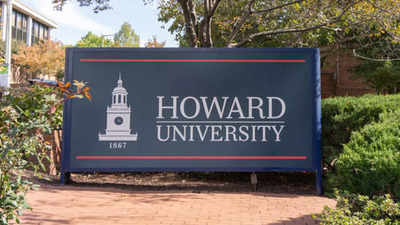
Howard University. (Getty Images)
On January 24, 2025, the Trump administration's proposed freeze on federal funding for higher education institutions sent shockwaves through the academic community, threatening the financial stability of dozens of colleges across the United States. Among those facing the direst consequences are institutions like Gallaudet University and Howard University, which rely heavily on federal funds to operate. This freeze could result in losses of up to 85% of their annual revenue.
A blow to historically HBCUs
For many colleges, especially historically Black colleges and universities (HBCUs) and institutions serving minority students, federal funding is a lifeline. According to Forbes, more than 30 colleges across the country are at risk of seeing their operating revenues slashed drastically due to the freeze. For some of these institutions, like Gallaudet University and Howard University, federal funds account for a significant portion of their budgets.
Federal funding for colleges typically supports a wide range of programs, including grants, appropriations, and research funding. Gallaudet University, a federally funded school for the deaf and hard of hearing, relies on federal support for 65% of its $213 million annual revenue. Similarly, Howard University, a renowned HBCU, depends on federal dollars for 30% of its annual budget. If these institutions lose such a significant portion of their revenue, it could lead to drastic cuts in academic programs, faculty, and student services.
How the freeze could impact specific schools
The freeze would not affect all colleges equally, but those with high reliance on federal grants and contracts will be hit hardest. As Forbes reported, Gallaudet University, United Tribes Technical College, and Stillman College could face revenue losses as high as 74% to 85%. These institutions have minimal endowments, making it extremely difficult to make up for lost federal funding.
Federal funding breakdown at high-risk colleges
The following breakdown highlights the federal funding as a percentage of annual revenue for all 30 of the most vulnerable colleges.
| Institution Name | Enrollment | Federal Funding % of Revenue | Total Federal Funding (Millions) | Federal Funding % of Endowment |
| United Tribes Technical College | 674 | 85% | $40 | 4422% |
| Saint Augustine's University | 1,251 | 74% | $18 | 2312% |
| Turtle Mountain Community College | 925 | 74% | $27 | 1099% |
| Voorhees University | 533 | 68% | $23 | 249% |
| Gallaudet University | 1,497 | 65% | $138 | 67% |
| Universidad Central de Bayamón | 904 | 59% | $6 | 398% |
| Massachusetts Institute of Technology | 12,829 | 52% | $1,657 | 7% |
| United Talmudic Seminary | 2,103 | 51% | $23 | N/A |
| Stillman College | 983 | 48% | $10 | 49% |
| Princeton University | 8,946 | 43% | $208 | 1% |
| Metropolitan College of New York | 921 | 42% | $9 | 1058.00% |
| Tougaloo College | 718 | 40% | $12 | 43.00% |
| Johns Hopkins University | 39,399 | 40% | $4,012 | 38% |
| Le Moyne-Owen College | 748 | 40% | $10 | 68.00% |
| Lane College | 1,195 | 40% | $12 | 146% |
| Rust College | 629 | 39% | $10 | 22% |
| Livingstone College | 930 | 39% | $13 | 193% |
| Morris College | $508 | 39% | $7 | 55% |
| Texas College | $872 | 37% | $6 | 77% |
| Allen University | 796 | 37% | $9 | 1505% |
| Atlantic University | 1,922 | 36% | $6 | N/A |
| Dillard University | 1,286 | 35% | $16 | 17% |
| Arkansas Baptist College | 646 | 33% | $4 | N/A |
| University of Dayton | 12,470 | 33% | $226 | 28% |
| Wiley University | 798 | 32% | $7 | 95% |
| Case Western Reserve University | 12,656 | 32% | $423 | 19% |
| Wilberforce University | 606 | 32% | $4 | 58% |
| Virginia University of Lynchburg | 1,167 | 31% | $5 | 157% |
| Howard University | 13,861 | 30% | $344 | 37% |
| Jarvis Christian University | 892 | 29% | $7 | 51% |
Data source: Forbes
Potential long-term consequences
The freeze is not only a financial challenge for these colleges but also a profound threat to the students they serve, many of whom are from underserved communities. These colleges are critical to ensuring access to higher education for Black, Native, and Hispanic students, who may not otherwise have access to college resources. As reported by Forbes, the Trump administration's decision could leave many of these students without a critical educational path.
While the freeze has not yet taken effect—due to a temporary restraining order from the United States District Court for the District of Rhode Island—the uncertainty remains. If implemented, this funding freeze could create a massive educational crisis, especially for institutions already struggling to maintain academic excellence and support their diverse student populations.

 2 months ago
80
2 months ago
80




























 English (US)
English (US)